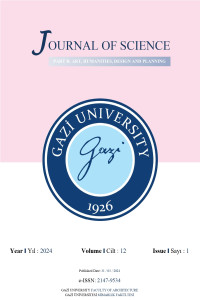Öz
The human being, who makes sense of the environment he lives in and expresses it in a factual and conceptual dimension, uses many methods while performing this meaning production. Semiology, which tries to read the semantic basis of the environment, which includes living and non-living beings as a whole and creates a dense network of relations, is one of these methods. The changing and developing structure of people's creations and uses on nature affects both the environment and the universe of meaning of designers and users. Semiology, which makes it possible to read natural and cultural structures as a text through signs, constitutes an important perspective for landscape architecture, which is one of the basic disciplines working on these structures. In this context, the study aims to produce perspectives on the use of semiotics in landscape planning and design. Thus, it will contribute to the development of a sustainable, creative and ecological attitude in both existing spaces and new space/area creations. In the study, first of all, the theoretical foundations of semiotics were emphasized, different interpretations of semiotics were discussed, and then an opinion was developed on how these perspectives could be used in landscape planning and design.
Anahtar Kelimeler
Teşekkür
We thank Lecturer Dr. Gülşah BİLGE ÖZTÜRK for the language editing.
Kaynakça
- [1] Nöth, W., 1995. (Handbuch der Semiotic, 1985) Handbook of Semiotics, Bloomington, Indiana University Press.
- [2] Akerson, E. F. (2016). Göstergebilime giriş. Bilge Kültür Sanat Yayınları, İstanbul.
- [3] Altun, O., İstanbul’un Turistik Yapılarının Göstergebilimsel Açıdan Çözümlenmesi: Ayasofya-i Kebir ve Sultan Ahmet Cami Örnekleri, Yüksek Lisans Tezi, İstanbul Üniversitesi Sosyal Bilimler Enstitüsü, İstanbul, 2021.
- [4] Rifat, M. (2018). Açıklamalı göstergebilim sözlüğü. Alfa Basım Yayım, İstanbul.
- [5] Kalelioğlu, M. (2020). Yazınsal göstergebilim. Seçkin Yayıncılık, Ankara.
- [6] Güneş, A., 2013. Göstergebilim Tarihi, e-Journal of New World Sciences Academy, 8, 4 (2013) 332-348.
- [7] Fiske, J. (2003). İletişim çalışmalarına giriş. Bilim ve Sanat Yayınları, Ankara.
- [8] Hafızoğlu, N. (2020). Çağdaş Türk resim sanatında kent imgesinin göstergebilim açısından incelenmesi. [Unpublished master’s thesis]. Akdeniz Üniversitesi Güzel Sanatlar Enstitüsü, Antalya.
- [9] Ataş, S., İç Mimarlık ve Çevre Tasarımında Geleneksel Mimarinin Çağdaş Yansımaları Bodrum Konutları Üzerine Göstergebilimsel Bir İnceleme, Yüksek Lisans Tezi, İstanbul Aydın Üniversitesi Fen Bilimleri Enstitüsü, İstanbul, 2018.
- [10] Gottdiener, M. (2005). Postmodern göstergeler. İmge Kitabevi, Ankara.
Öz
Kaynakça
- [1] Nöth, W., 1995. (Handbuch der Semiotic, 1985) Handbook of Semiotics, Bloomington, Indiana University Press.
- [2] Akerson, E. F. (2016). Göstergebilime giriş. Bilge Kültür Sanat Yayınları, İstanbul.
- [3] Altun, O., İstanbul’un Turistik Yapılarının Göstergebilimsel Açıdan Çözümlenmesi: Ayasofya-i Kebir ve Sultan Ahmet Cami Örnekleri, Yüksek Lisans Tezi, İstanbul Üniversitesi Sosyal Bilimler Enstitüsü, İstanbul, 2021.
- [4] Rifat, M. (2018). Açıklamalı göstergebilim sözlüğü. Alfa Basım Yayım, İstanbul.
- [5] Kalelioğlu, M. (2020). Yazınsal göstergebilim. Seçkin Yayıncılık, Ankara.
- [6] Güneş, A., 2013. Göstergebilim Tarihi, e-Journal of New World Sciences Academy, 8, 4 (2013) 332-348.
- [7] Fiske, J. (2003). İletişim çalışmalarına giriş. Bilim ve Sanat Yayınları, Ankara.
- [8] Hafızoğlu, N. (2020). Çağdaş Türk resim sanatında kent imgesinin göstergebilim açısından incelenmesi. [Unpublished master’s thesis]. Akdeniz Üniversitesi Güzel Sanatlar Enstitüsü, Antalya.
- [9] Ataş, S., İç Mimarlık ve Çevre Tasarımında Geleneksel Mimarinin Çağdaş Yansımaları Bodrum Konutları Üzerine Göstergebilimsel Bir İnceleme, Yüksek Lisans Tezi, İstanbul Aydın Üniversitesi Fen Bilimleri Enstitüsü, İstanbul, 2018.
- [10] Gottdiener, M. (2005). Postmodern göstergeler. İmge Kitabevi, Ankara.
Ayrıntılar
| Birincil Dil | İngilizce |
|---|---|
| Konular | Göstergebilim |
| Bölüm | Mimarlık |
| Yazarlar | |
| Yayımlanma Tarihi | 31 Mart 2024 |
| Gönderilme Tarihi | 12 Eylül 2023 |
| Yayımlandığı Sayı | Yıl 2024 Cilt: 12 Sayı: 1 |

